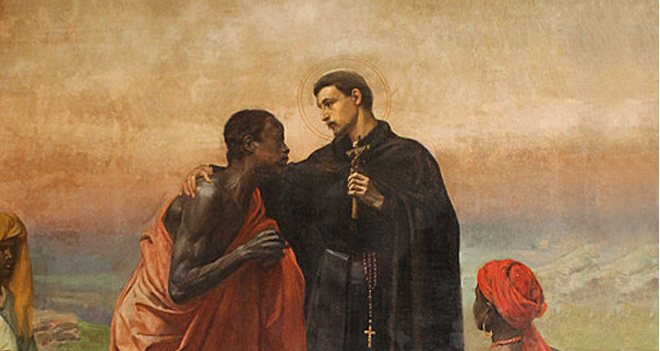A Second Look: The Universal God
6th Sunday of Easter (B)
click here for readings
As I have mentioned before, one of my favorite things about the Easter season is the attention paid in the liturgy to the Acts of the Apostles. This is the history of the very earliest days of the Church. It is our “origin story” as Catholics. Reading the book of Acts reminds us, if we let it, of just how radical a thing Christianity was when it began 2000 years ago.
In this Sunday’s first reading, St. Peter, our first pope, has an encounter with a man named Cornelius. Cornelius is a Roman centurion, and so not an ethnic Jew. But he was what was known as a “God-fearer” — a Gentile who admired Judaism, worshiped Yahweh, attended synagogue, and followed many of the moral and religious precepts of the Torah. But he was still a Gentile and considered “unclean.” He was still very much “other” from the perspective of the Jewish people. Cornelius invites Peter to come to his house, where he has gathered his friends and family.
Peter comes to him — despite the fact that Jews were not supposed to associate with or visit the homes of people from other nations (Acts 10:28). But Peter tells these God fearing men and women, “In truth, I see that God shows no partiality. Rather, in every nation whoever fears him and acts uprightly is acceptable to him” (Acts 10:34-35). And so he baptizes Cornelius and his household, bringing these Gentile people into union with the Church as full members and not second-class citizens.
A Second Look
The fact that Peter baptizes Cornelius might not seem at all unusual for us today. The Catholic Church has members all across the globe, of every nationality and ethnicity. But at the time Peter first offered baptism to these uncircumcised Gentiles, it was a radical paradigm shift.
As I mentioned in a blog post last week, the word “Catholic” means universal. It’s not for nothing that the Church Christ founded would come to be known by this name. The major thing that made Christianity stand out among all other religions was precisely its universality.
It is easy for us to take this for granted. We practice a monotheistic religion. We believe in one God, who is God of the whole universe, and therefore is of universal scope. Outside of Christianity, two other major world religions — Judaism and Islam — are also monotheistic. But other world religions believe in many gods. That’s true of Hinduism and Shintoism, for example. It was certainly true of ancient pagan religions. The three great monotheistic religions — Judaism, Christianity and Islam — originate in Judaism, which stood out among all ancient religions precisely because of its unusual monotheistic claims.
National Gods
It was common in the ancient world for each people or nation to have its own ethnic pantheon of gods and goddesses. For the most part, these ancient cults were not viewed as mutually exclusive. The Romans who occupied Egypt, for example, saw no conflict in worshiping their Roman gods alongside the local Egyptian gods.
What made the Jewish people unusual among ancient cultures was not just that they only worshiped one God, but that their God demanded fidelity. “You shall have no other gods before me” (Ex 20:3). Unlike their pagan neighbors, the Jews were not allowed to worship the gods of other peoples. God’s special covenant with the Jewish people was like a marriage covenant. It was exclusive.
Over time, an understanding developed that not only was it wrong to worship foreign gods because it would violate their covenant with Yahweh; it was also wrong to worship foreign gods because they were false. The Jewish God was the only true God. But he was still understood as the God of the Jewish people. That’s why it was so difficult for those like the Roman Cornelius to be integrated into the Jewish faith, because to do so required one to become Jewish, including circumcision for males. There was no real distinction between the Jewish religion, ethnicity and nationality. They were one and the same.
A Universal Religion
Things changed with the introduction of Christianity. In the very beginning, the Church consisted of Jewish men and women who worshiped Jesus Christ as the Jewish Messiah. But it did not take long before people began to realize that Christianity was more than just a Jewish cult. This new religion was not a small subset of Judaism, but an outreach to the world. Jesus Christ had revealed that the Jewish God, the God of Abraham, Isaac and Jacob, was not just God of the Jewish nation, but God of all peoples. He is the universal God. And He left His Church with a mandate to preach the good news to all nations.
This means that salvation in Christ is available to every man, woman and child on the planet, no matter their age, sex, ethnicity, skin color or social class. There is no one outside the reach of God’s love. There is no one unable to be received into the Church.
As Peter proclaims to Cornelius, “In truth, I see that God shows no partiality. Rather, in every nation whoever fears him and acts uprightly is acceptable to him.” From Jerusalem and Judea, to Antioch and Alexandria, to Rome, and to the ends of the earth, the Christian gospel spread. It is something the world had never seen before — a religion without borders.
Most Christians today are not ethnically Jewish. They are European, Arab, African, Hispanic, Asian — every color of the human rainbow. You and I are Christian because it is a religion without borders.
It remains a religion without borders. This is the very meaning of Catholic. Let us never hesitate to welcome others into our faith. Let us never cease to preach the good news of Christ to the people of every nation.

